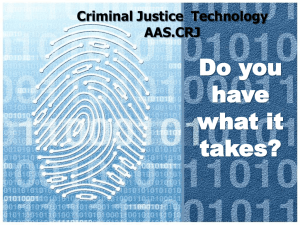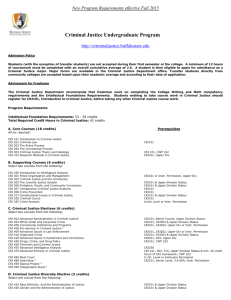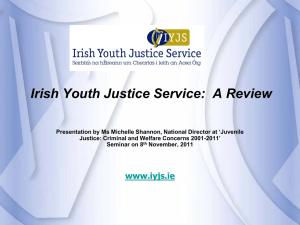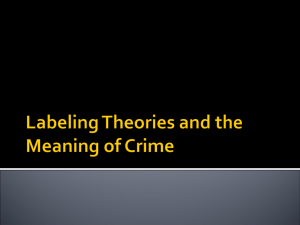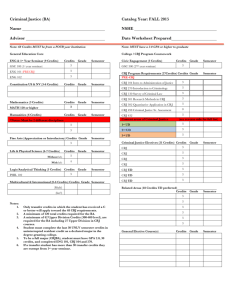Crime Analyst - California State University, Sacramento
advertisement
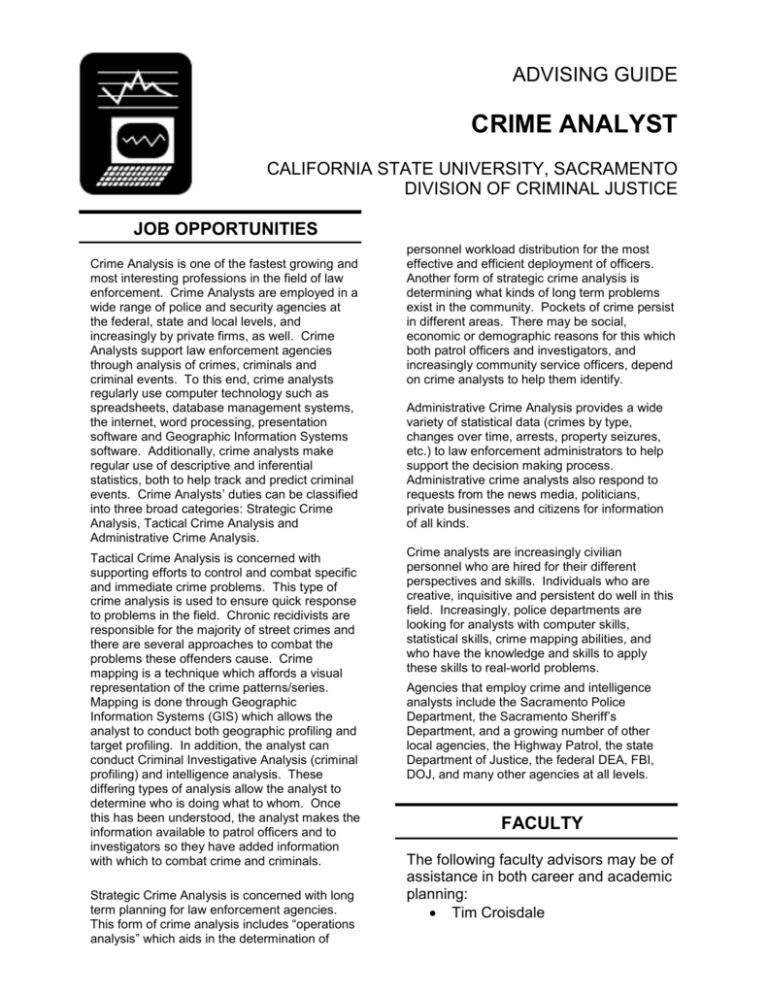
ADVISING GUIDE CRIME ANALYST CALIFORNIA STATE UNIVERSITY, SACRAMENTO DIVISION OF CRIMINAL JUSTICE JOB OPPORTUNITIES Crime Analysis is one of the fastest growing and most interesting professions in the field of law enforcement. Crime Analysts are employed in a wide range of police and security agencies at the federal, state and local levels, and increasingly by private firms, as well. Crime Analysts support law enforcement agencies through analysis of crimes, criminals and criminal events. To this end, crime analysts regularly use computer technology such as spreadsheets, database management systems, the internet, word processing, presentation software and Geographic Information Systems software. Additionally, crime analysts make regular use of descriptive and inferential statistics, both to help track and predict criminal events. Crime Analysts’ duties can be classified into three broad categories: Strategic Crime Analysis, Tactical Crime Analysis and Administrative Crime Analysis. Tactical Crime Analysis is concerned with supporting efforts to control and combat specific and immediate crime problems. This type of crime analysis is used to ensure quick response to problems in the field. Chronic recidivists are responsible for the majority of street crimes and there are several approaches to combat the problems these offenders cause. Crime mapping is a technique which affords a visual representation of the crime patterns/series. Mapping is done through Geographic Information Systems (GIS) which allows the analyst to conduct both geographic profiling and target profiling. In addition, the analyst can conduct Criminal Investigative Analysis (criminal profiling) and intelligence analysis. These differing types of analysis allow the analyst to determine who is doing what to whom. Once this has been understood, the analyst makes the information available to patrol officers and to investigators so they have added information with which to combat crime and criminals. Strategic Crime Analysis is concerned with long term planning for law enforcement agencies. This form of crime analysis includes “operations analysis” which aids in the determination of personnel workload distribution for the most effective and efficient deployment of officers. Another form of strategic crime analysis is determining what kinds of long term problems exist in the community. Pockets of crime persist in different areas. There may be social, economic or demographic reasons for this which both patrol officers and investigators, and increasingly community service officers, depend on crime analysts to help them identify. Administrative Crime Analysis provides a wide variety of statistical data (crimes by type, changes over time, arrests, property seizures, etc.) to law enforcement administrators to help support the decision making process. Administrative crime analysts also respond to requests from the news media, politicians, private businesses and citizens for information of all kinds. Crime analysts are increasingly civilian personnel who are hired for their different perspectives and skills. Individuals who are creative, inquisitive and persistent do well in this field. Increasingly, police departments are looking for analysts with computer skills, statistical skills, crime mapping abilities, and who have the knowledge and skills to apply these skills to real-world problems. Agencies that employ crime and intelligence analysts include the Sacramento Police Department, the Sacramento Sheriff’s Department, and a growing number of other local agencies, the Highway Patrol, the state Department of Justice, the federal DEA, FBI, DOJ, and many other agencies at all levels. FACULTY The following faculty advisors may be of assistance in both career and academic planning: Tim Croisdale SUGGESTED COURSE SEQUENCE Freshman Year CRJ 001 CRJ 002 CRJ 005 Intro to CRJ & Society Law of Crimes Community & the Justice System Suggested GE Electives SOC 001 (D1A) Sophomore Year CRJ 004 Gen. Investigative Techniques CRJ 101 Intro to CRJ Research Methods CRJ 102 Crime & Punishment CRJ Elective SOC 101 Intro to Stats for Soc CRJ Elective SOC 106 Demography * Suggested GE Electives HIST 163 (D2) Suggested Electives Electives must be drawn from at least three of the listed “Areas of Interest,” of which one must be “Supporting Courses.” The University Advanced Study graduation requirement may be completed in the major or as part of the GE pattern. An approved minor may be substituted for up to 12 units of the major elective courses and fulfills the requirement for selection of a course from the “Supporting Courses.” The following is an excerpt. Consult the Major Planning Worksheet for the full list of electives . Area of Interest I - Administration CRJ 168 CRJ 191A CRJ Information Systems Topics in CRJ Administration Area of Interest II - Investigations CRJ 153 CRJ 156 Advanced Criminal Investigation Intro to Crime & Intelligence Analysis Area of Interest III - Corrections none Area of Interest IV – Offenses & Offenders Junior Year CRJ 121 CRJ 130 CRJ 141 CRJ 160 CRJ Elective CRJ Elective CRJ Elective CRJ 106 CRJ 112 CRJ 114 CRJ 115 CRJ 117 CRJ 118 Struct & Func of American Courts Fundamentals of Corrections Police & Society Criminal Justice Administration GEOG 109 Geographic Info Sys * Analysis of Career Criminals Gangs & Threat Groups in America Sexual Offenses & Offenders Violence & Terrorism American CRJ & Minority Groups Drug Abuse & Criminal Behavior Area of Interest V - Law none Area of Interest VI – Additional Courses Senior Year CRJ 123 CRJ 190 CRJ Elective CRJ Elective CRJ Elective CRJ 195 Law of Arrest, Search, & Seizure Contemporary Issues in CRJ Area of Interest VII – Supporting Courses ENGL 118T ETHN 100 ETHN 110 ETHN 131 ETHN 140 ETHN 170 ETHN 173 SOC 110 Urban Life & Problems * Suggested GE Electives SOC 158 (E) Note: This is a suggested sequence for a full time (15 units) student. Course sequence may have to be modified in response to course availability. Students interested in pursuing a minor should seek advice from a CRJ advisor. Foreign language is strongly recommended (especially Spanish). * A substitution petition needs to be on file to use these electives for graduation in the Criminal Justice major. Students are advised to seek guidance early in their academic careers. Internship * * * * * GEOG 109 GEOG 110 GEOG 163 GEOG 181 HIST 163 PSYC 168 SOC 101 SOC 106 SOC 110 SOC 155 SOC 156 SOC 158 Technical Writing Ethnic America Asian Americans: Status & Identity La Raza Studies Native American Experience African American Experience The Black Family in the U.S. Geographic Information Systems Advanced Geographic Information Systems Applied GIS Spatial Analysis The City of United States History Abnormal Psychology Intro to Stats for Sociologists Demography Urban Life & Problems Criminology Delinquency Sociology of Deviance
